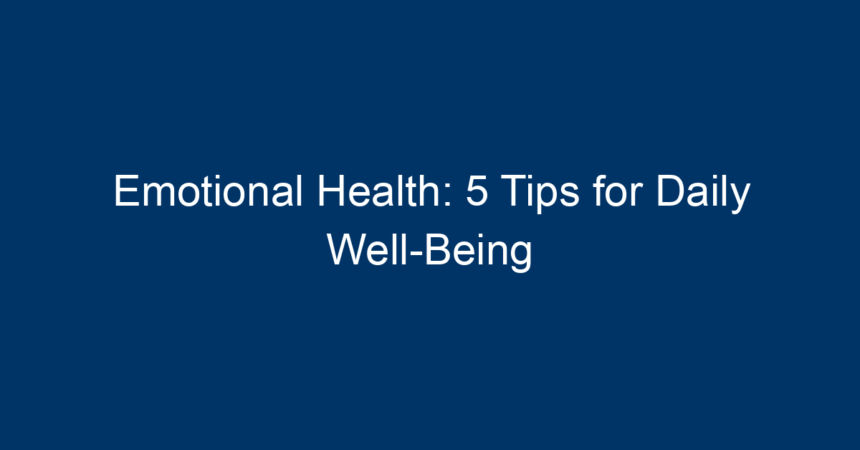In today’s fast-paced world, emotional health has become a critical component of our overall well-being. It influences how we think, feel, and interact with others. Just like physical health, nurturing emotional health is vital for leading a fulfilling life. But with the constant demands of work, family, and social commitments, how can we prioritize our emotional well-being? Here are five practical tips to enhance your emotional health daily.
Understanding Emotional Health
Emotional health refers to your ability to manage your feelings and cope with life’s challenges. It encompasses how you think, feel, and behave. Good emotional health enhances your ability to enjoy life, build relationships, and cope with stress. On the other hand, poor emotional health can lead to various mental health issues, such as anxiety and depression.
The Importance of Emotional Health
Maintaining emotional health is essential for several reasons:
- Improved Relationships: Healthy emotional states help us connect better with others and enhance our relationships.
- Resilience: A stable emotional state equips us to handle stress and rebounds from setbacks more effectively.
- Greater Productivity: When we are emotionally balanced, our focus and motivation increase, leading to improved performance in work and personal life.
Tip 1: Practice Mindfulness Meditation
One of the most effective ways to enhance emotional health is through mindfulness. Mindfulness meditation encourages you to focus on the present moment, allowing you to observe your thoughts and feelings without judgment.
Benefits of Mindfulness
- Stress Reduction: Mindfulness can significantly lower cortisol levels, helping you manage stress better.
- Enhanced Self-Awareness: Regular practice promotes better understanding of your emotional responses, enabling you to react to situations more mindfully.
- Improved Emotional Regulation: By observing your thoughts and feelings, you can develop healthier coping mechanisms.
How to Get Started:
- Start Small: Begin with just five minutes a day.
- Choose a Quiet Space: Find a calm and comfortable environment where you won’t be disturbed.
- Use Guided Meditations: Apps like Headspace or Calm offer excellent resources for beginners.
Tip 2: Maintain Physical Activity
Physical activity is not only beneficial for physical health; it plays a crucial role in emotional well-being as well. Exercise releases endorphins, neurotransmitters that enhance mood and promote feelings of happiness.
How Exercise Affects Emotional Health
- Reduces Anxiety: Regular physical activity helps alleviate symptoms of anxiety and depression by promoting the release of serotonin.
- Increases Confidence: Achieving fitness goals can boost self-esteem.
- Enhances Sleep: Better sleep quality improves overall emotional health.
Activities to Consider:
- Yoga: Combines physical movement with breath control, supporting both physical and emotional health.
- Walking or Jogging: Simple yet effective for clearing your mind and boosting mood.
- Group Classes: Engaging in group activities can foster community and connection.
Tip 3: Foster Meaningful Connections
The relationships we cultivate are a crucial aspect of our emotional health. Socializing can be incredibly beneficial, providing support during challenging times and enhancing our overall happiness.
The Power of Social Connections
- Support Systems: Having a network of friends or family can improve resilience against stress.
- Increased Happiness: Positive relationships enhance feelings of joy and life satisfaction.
- Better Coping Mechanisms: Sharing experiences with others can help you gain new perspectives, making life’s challenges easier to navigate.
Ways to Foster Connections:
- Schedule Regular Catch-Ups: Make it a point to meet friends or family regularly, even if it’s just a quick coffee.
- Join Clubs or Groups: Engaging with people who share your interests can lead to meaningful conversations and friendships.
- Volunteer: Helping others can provide a sense of purpose and foster connection.
Tip 4: Prioritize Self-Care
Self-care is not just a buzzword; it’s a crucial practice for improving emotional health. Taking time to recharge and nurture yourself can lead to significant benefits across multiple areas of life.
The Role of Self-Care in Emotional Health
- Prevention of Burnout: Regular self-care helps to maintain a balance, preventing emotional exhaustion.
- Boosts Mood: Engaging in activities you enjoy can significantly enhance your emotional state.
- Enhances Self-Esteem: Prioritizing yourself reinforces the concept that you deserve care and attention.
Self-Care Ideas:
- Create Evening Routines: End your day with relaxing activities, such as reading or taking a warm bath.
- Pursue Hobbies: Engage in activities that make you feel fulfilled, whether it’s painting, baking, or gardening.
- Unplug from Technology: Take regular breaks from screens to recharge mentally.
Tip 5: Seek Professional Help When Needed
Sometimes, emotional challenges can feel overwhelming, and seeking professional help is not only acceptable but advisable. Therapy can provide you with tools and strategies to improve your emotional health effectively.
Benefits of Therapy
- Safe Space: Therapy offers a confidential environment to discuss your emotions openly.
- Personalized Strategies: A therapist can help you develop tailored strategies for coping with stress and improving emotional health.
- Increased Insight: Professionals can help you gain deeper insights into your thoughts and behaviors, promoting personal growth.
Choosing the Right Professional:
- Research Options: Look for therapists who specialize in emotional health.
- Consider a Trial Session: Many therapists offer a first session for free; this can help you find the right fit.
- Be Open: Approach therapy with an open mind and a willingness to explore your emotions.
Conclusion
Caring for your emotional health is an essential aspect of living a balanced and fulfilling life. By incorporating practices such as mindfulness, regular exercise, fostering connections, prioritizing self-care, and seeking professional help when necessary, you can significantly improve your emotional well-being.
Remember, nurturing your emotional health is a continuous journey. Start by integrating just one or two of these tips into your daily routine and notice the positive changes over time. Your emotional health deserves attention and care, and the benefits are well worth the effort. Prioritize yourself, and watch how it transforms not just your life, but also your relationships and overall happiness.




